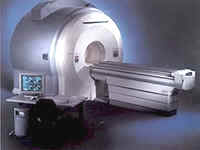|
|
||||||||||||||
|
Magnetic resonance imaging (MRI Scan) |
||||||||||||||
The scan is usually done as an outpatient procedure. It is recommended to wear loose-fitting clothes without any metal fasteners. Before the test you will be asked to remove watches, hearing aids as well as all jewellery from your body as metal and electronic objects can interfere with the powerful magnetic field the patients are exposed to during the test. Inform the radiographer if you have any medical or electronic devices in your body (such as implanted electronic devices, artificial limbs, metal screws etc.). People with cardiac pacemakers, defibrillators or ear implants cannot be scanned with MRI technique. You will have to fill in safety questionnaire before the test. The radiologist should also know about any patient's serious health problems. Sometimes in MRI we are looking at very tiny structures and the initial scans do not give us all the information required by your doctor. In these cases, we will need to give you an injection of a contrast agent (dye) which helps to make the image clearer. If an injection is needed, it will be given in the arm and should not make you feel any different. When you are ready the radiographer will position you on the bed and explain exactly what will happen. You have to lie still on the scanning bed for 15- 45 minutes. The scanner will make a loud banging noise. The procedure is painless however some patients may feel claustrophobic. If you think this might be your case, consult your doctor beforehand. Some medication might be given to help you relax. The radiographer will not stay in the room with you. Should you need an assistance, you can buzz at any time. Breast MRI is a relatively new procedure and is not available in all centres so patients may have to travel. The are some other issues with patients should know:-
Further general information Your doctors and specialist nurses are in an ideal position to give you relevant information on your disease and treatment as they know your individual circumstances. Cancerbackup has a help line (0808 800 1234) and a prize winning video available in English, Italian, Urdu, Bengali, Gujarati & Hindi explaining Radiotherapy & Chemotherapy. Cancernet.co.uk has over 500 pages describing cancer, its management, practical tips and tool which patients, their carers and their doctors have found helpful during the cancer journey. |
||||||||||||||
 Magnetic
resonance imaging (MRI) is a modern scanning technique which uses magnetic and radio waves to view and create pictures of internal structures within
a body. Patients having MRI scan are not exposed to x-rays. The information
acquired can be converted into a computerised black and
white image which can detect and define any abnormalities. These images are read
and evaluated by radiologist and sent to the doctor who requested the MRI scan. Detailed MRI images
allow the physicians to evaluate the patient's situation more effectively. It
can be used as a supplement tool to gain additional information about changes within breast detected
with
Magnetic
resonance imaging (MRI) is a modern scanning technique which uses magnetic and radio waves to view and create pictures of internal structures within
a body. Patients having MRI scan are not exposed to x-rays. The information
acquired can be converted into a computerised black and
white image which can detect and define any abnormalities. These images are read
and evaluated by radiologist and sent to the doctor who requested the MRI scan. Detailed MRI images
allow the physicians to evaluate the patient's situation more effectively. It
can be used as a supplement tool to gain additional information about changes within breast detected
with 



